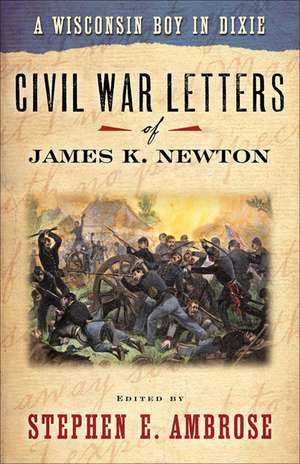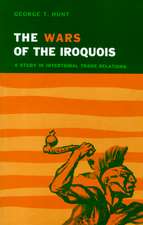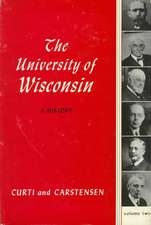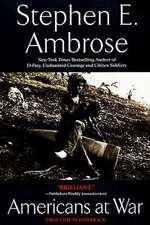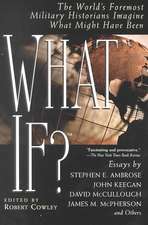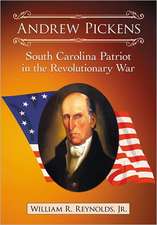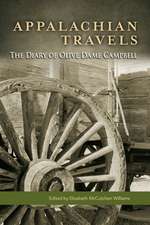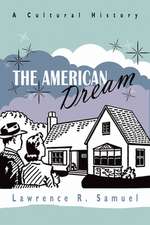A Wisconsin Boy in Dixie: Civil War Letters of James K. Newton: A North Coast Book
Editat de Stephen E. Ambroseen Limba Engleză Paperback – 15 mar 1995
“Unlike many of his fellows, [James Newton] was knowledgeable, intuitive, and literate; like many of his fellows he was cast into the role of soldier at only eighteen years of age. He was polished enough to write drumhead and firelight letters of fine literary style. It did not take long for this farm boy turned private to discover the grand design of the conflict in which he was engaged, something which many of the officers leading the armies never did discover.”—Victor Hicken, Journal of the Illinois State Historical Society
“When I wrote to you last I was at Madison with no prospect of leaving very soon, but I got away sooner than I expected to.” So wrote James Newton upon leaving Camp Randall for Vicksburg in 1863 with the Fourteenth Wisconsin Volunteer Infantry. Newton, who had been a rural schoolteacher before he joined the Union army in 1861, wrote to his parents of his experiences at Shiloh, Corinth, Vicksburg, on the Red River, in Missouri, at Nashville, at Mobile, and as a prisoner of war. His letters, selected and edited by noted historian Stephen E. Ambrose, reveal Newton as a young man who matured in the war, rising in rank from private to lieutenant.
A Wisconsin Boy in Dixie reveals Newton as a young man who grew to maturity through his Civil War experience, rising in rank from private to lieutenant. Writing soberly about the less attractive aspects of army life, Newton's comments on fraternizing with the Rebs, on officers, and on discipline are touched with a sense of humor—"a soldier's best friend," he claimed. He also became sensitive to the importance of political choices. After giving Lincoln the first vote he had ever cast, Newton wrote: "In doing so I felt that I was doing my country as much service as I have ever done on the field of battle."
“When I wrote to you last I was at Madison with no prospect of leaving very soon, but I got away sooner than I expected to.” So wrote James Newton upon leaving Camp Randall for Vicksburg in 1863 with the Fourteenth Wisconsin Volunteer Infantry. Newton, who had been a rural schoolteacher before he joined the Union army in 1861, wrote to his parents of his experiences at Shiloh, Corinth, Vicksburg, on the Red River, in Missouri, at Nashville, at Mobile, and as a prisoner of war. His letters, selected and edited by noted historian Stephen E. Ambrose, reveal Newton as a young man who matured in the war, rising in rank from private to lieutenant.
A Wisconsin Boy in Dixie reveals Newton as a young man who grew to maturity through his Civil War experience, rising in rank from private to lieutenant. Writing soberly about the less attractive aspects of army life, Newton's comments on fraternizing with the Rebs, on officers, and on discipline are touched with a sense of humor—"a soldier's best friend," he claimed. He also became sensitive to the importance of political choices. After giving Lincoln the first vote he had ever cast, Newton wrote: "In doing so I felt that I was doing my country as much service as I have ever done on the field of battle."
Preț: 188.79 lei
Nou
Puncte Express: 283
Preț estimativ în valută:
36.13€ • 38.63$ • 30.12£
36.13€ • 38.63$ • 30.12£
Carte tipărită la comandă
Livrare economică 18 aprilie-02 mai
Preluare comenzi: 021 569.72.76
Specificații
ISBN-13: 9780299024840
ISBN-10: 0299024849
Pagini: 206
Ilustrații: 13 halftones, 3 maps
Dimensiuni: 140 x 216 x 5 mm
Greutate: 0.25 kg
Ediția:1
Editura: University of Wisconsin Press
Colecția University of Wisconsin Press
Seria A North Coast Book
ISBN-10: 0299024849
Pagini: 206
Ilustrații: 13 halftones, 3 maps
Dimensiuni: 140 x 216 x 5 mm
Greutate: 0.25 kg
Ediția:1
Editura: University of Wisconsin Press
Colecția University of Wisconsin Press
Seria A North Coast Book
Recenzii
“[Stephen E. Ambrose’s] collection of James Newton’s letters to his parents will appeal to readers who want to go beyond the din of battle and the oratory of politicians and look at the Civil War from a different perspective, that of a common soldier writing home.”—Kliatt
Notă biografică
James K. Newton (1843–1892) served in the Union Infantry from 1861 to 1865. Later, he studied at Oberlin College in Ohio, where he remained as professor of French and German until 1888. He died in California in 1892. Stephen E. Ambrose (1936–2002) was professor of history at the University of New Orleans. Among his many books are Undaunted Courage, Band of Brothers, and Citizen Soldiers.
Descriere
“Unlike many of his fellows, [James Newton] was knowledgeable, intuitive, and literate; like many of his fellows he was cast into the role of soldier at only eighteen years of age. He was polished enough to write drumhead and firelight letters of fine literary style. It did not take long for this farm boy turned private to discover the grand design of the conflict in which he was engaged, something which many of the officers leading the armies never did discover.”—Victor Hicken, Journal of the Illinois State Historical Society
“When I wrote to you last I was at Madison with no prospect of leaving very soon, but I got away sooner than I expected to.” So wrote James Newton upon leaving Camp Randall for Vicksburg in 1863 with the Fourteenth Wisconsin Volunteer Infantry. Newton, who had been a rural schoolteacher before he joined the Union army in 1861, wrote to his parents of his experiences at Shiloh, Corinth, Vicksburg, on the Red River, in Missouri, at Nashville, at Mobile, and as a prisoner of war. His letters, selected and edited by noted historian Stephen E. Ambrose, reveal Newton as a young man who matured in the war, rising in rank from private to lieutenant.
A Wisconsin Boy in Dixie reveals Newton as a young man who grew to maturity through his Civil War experience, rising in rank from private to lieutenant. Writing soberly about the less attractive aspects of army life, Newton's comments on fraternizing with the Rebs, on officers, and on discipline are touched with a sense of humor—"a soldier's best friend," he claimed. He also became sensitive to the importance of political choices. After giving Lincoln the first vote he had ever cast, Newton wrote: "In doing so I felt that I was doing my country as much service as I have ever done on the field of battle."
“When I wrote to you last I was at Madison with no prospect of leaving very soon, but I got away sooner than I expected to.” So wrote James Newton upon leaving Camp Randall for Vicksburg in 1863 with the Fourteenth Wisconsin Volunteer Infantry. Newton, who had been a rural schoolteacher before he joined the Union army in 1861, wrote to his parents of his experiences at Shiloh, Corinth, Vicksburg, on the Red River, in Missouri, at Nashville, at Mobile, and as a prisoner of war. His letters, selected and edited by noted historian Stephen E. Ambrose, reveal Newton as a young man who matured in the war, rising in rank from private to lieutenant.
A Wisconsin Boy in Dixie reveals Newton as a young man who grew to maturity through his Civil War experience, rising in rank from private to lieutenant. Writing soberly about the less attractive aspects of army life, Newton's comments on fraternizing with the Rebs, on officers, and on discipline are touched with a sense of humor—"a soldier's best friend," he claimed. He also became sensitive to the importance of political choices. After giving Lincoln the first vote he had ever cast, Newton wrote: "In doing so I felt that I was doing my country as much service as I have ever done on the field of battle."
